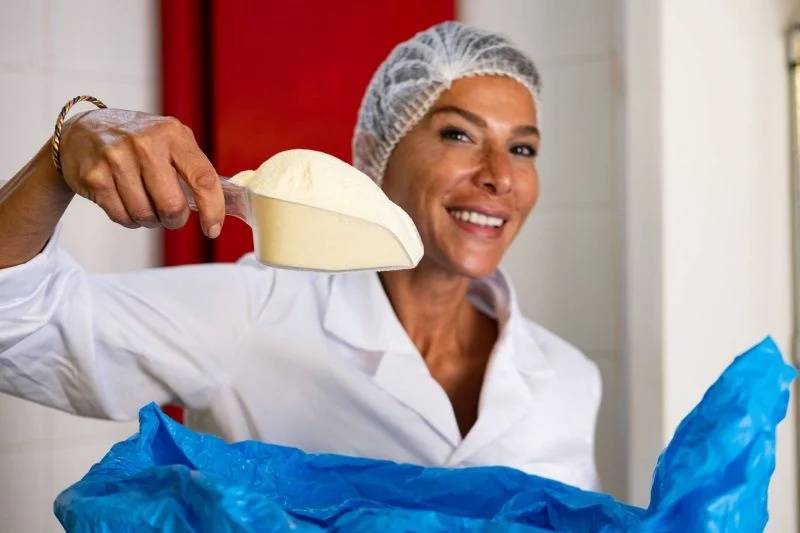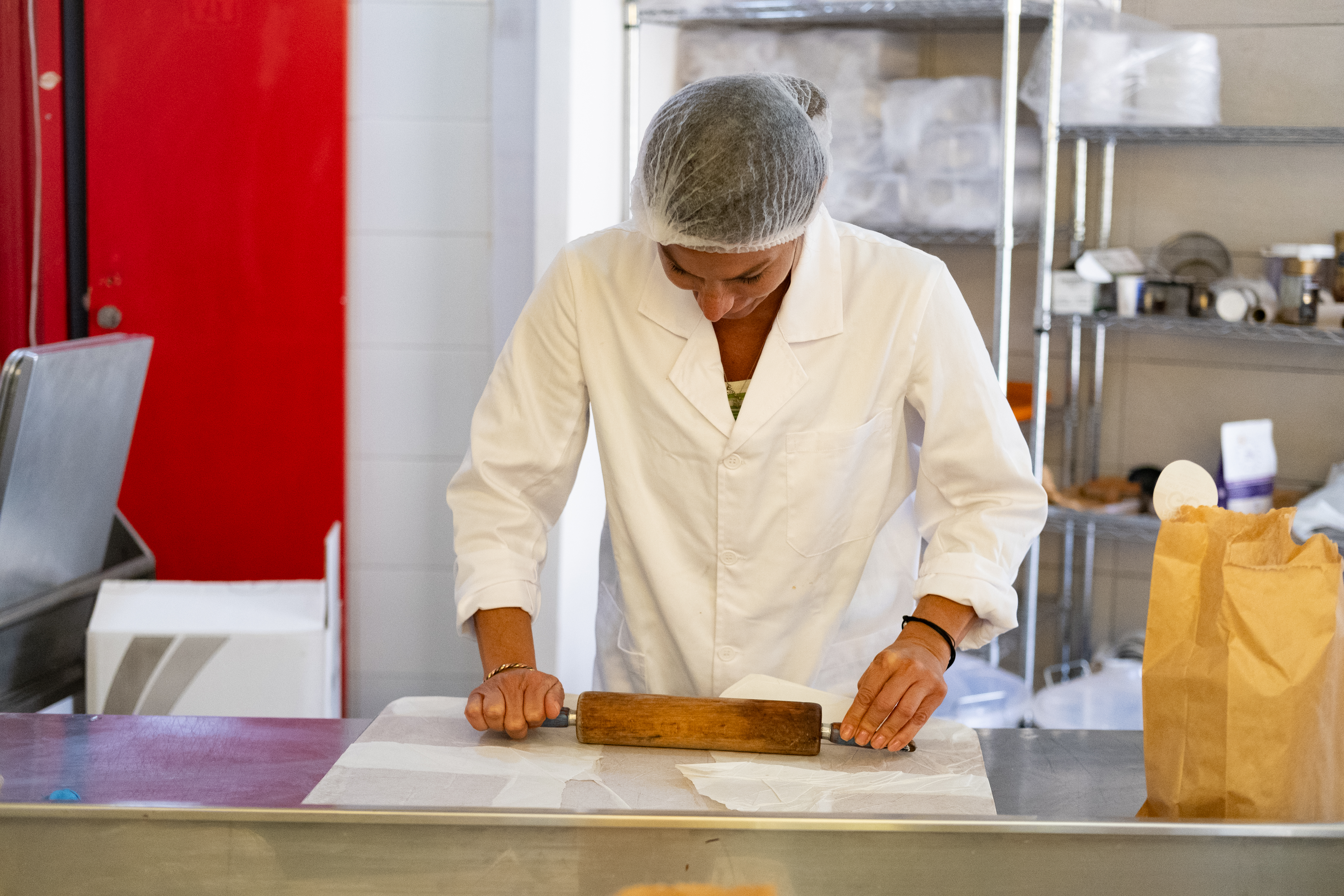
The creator of Fuel To Go has a secret ingredient: dehydrated egg white powder. (Credit: Chloé Lavoisard)
With a hairnet on her head and a big smile on her face, Inas Khaled opened the doors of her kitchen in Hazmieh, on the outskirts of Beirut.
Once past the staircase, a multitude of tempting smells waft from the ovens behind which the magic of Fuel To Go is worked. Officially launched in May 2021, the company has just one full-time employee, Elham Baaklini, with whom the founder works side by side on a daily basis.
Protein bars, cranberry cakes, dark chocolate power balls. “My favorite are the homemade peanut butter protein bars!” said the manager.
The reason she enjoys these sweet treats so much is that, until she set up her own business, it was virtually impossible for her to find protein products suited to her health: “I’m gluten and lactose intolerant. For a long time, I looked for alternatives to the products on the market, but they simply didn’t exist,” she said.
Before dedicating herself full-time to Fuel To Go in 2021, Khaled was a sports coach in several Beirut gyms and an account manager in a production company, working two jobs, like many Lebanese, to try and make ends meet.
But everything fell apart for her in 2020 when another crisis — this time a global one — added to Lebanon’s socio-economic collapse: COVID-19. While the country was under lockdown, the 40-year-old stayed at home with no job and no income. “I was broke and desperate,” she recalled.
So much so that she considered leaving Lebanon. But as she explained: “It’s very difficult to imagine leaving and starting a new life somewhere else. Here, I can do what I want, and I’ll have the support of my friends and family.” That is particularly true since she’s not alone: she’s the mother of a 15-year-old teenager, Karim. “Even though I’ve thought about leaving, I’m very attached to my country and the well-being of my son.”
‘Self-made woman’
But the entrepreneur is not one to give up. In her own words, she’s a “self-made woman.” To escape the boredom of confinement, she decided to pursue an idea she’d had in her head for a long time: to find an alternative to the protein foods on the market, using 100 percent natural ingredients that everyone could consume.
She explored the internet and came across an ingredient that would change her life: dried egg white powder. Khaled tried out all sorts of recipes: muffins, cakes, protein bars. The verdict: she had found her secret ingredient.
 Inas Khaled making protein bars in her kitchen in Hazmieh. (Credit: Chloé Lavoisard)
Inas Khaled making protein bars in her kitchen in Hazmieh. (Credit: Chloé Lavoisard)
After her solo tests, it was her friends’ turn to taste them: “They were very encouraging, and it was they who pushed me to market my creations. Still in her family kitchen, Khaled set about her business in earnest. But electricity shortages in Lebanon at that time meant she had to go back and forth to a friend’s house, where the fridge was running all day. A “very tiring time,” she recalled.
Finally, all things come to those who wait, and one event propelled her project forward. “I sent samples of my products to one of my sister’s friends. She loved them and bought them from me for $1,000. It was nowhere near the value of what I’d sent her, but she wanted to help me get started. I can’t thank her enough,” she said. The donation enabled her to invest in her kitchen in Hazmieh and launch her brand.
Around 40 sales outlets
Fuel To Go quickly became popular. “Our distribution in Lebanon has gradually expanded,” she said proudly. The brand is now available in over 40 outlets across the country, between Beirut and Tripoli. Sports outlets, pharmacies and even petrol stations distribute Fuel To Go products, which are sold at LL240,000 for an energy bar and LL1,300,000 for a jar of nut and seed butter.
Although the founder does not wish to reveal her turnover, Khaled sells around 200 items a day. A steady stream of production for the two friends. “I’m very lucky to have Elham by my side,” she said.
First thing in the morning: pitting the dates. “We don’t buy them already pitted because they contain oil,” Khaled explained. The rest of the ingredients are also prepared on site, and almost everything, “except the egg white powder and the chocolate,” comes from Lebanon. Sheis keen to avoid using sugar, so she concentrates on alternatives: “We make our own peanut butter and use dates.”
 Dates are a flagship product of the Fuel To Go company for their energetic properties. (Credit: Chloé Lavoisard)
Dates are a flagship product of the Fuel To Go company for their energetic properties. (Credit: Chloé Lavoisard)
Despite this frenetic pace, the entrepreneur still finds time to go to the gym, where her snacks are a big hit: “Everyone asks me to taste them and bring them along, which makes me very happy.”
Now that the idea of launching her own business is a reality, true to her character, Khaled is aiming even higher. “I want to improve the packaging of my products, my logo and why not extend my business to the Gulf countries. But before that, I’d like my products to be sold across Lebanon. That’s on the way.”
This article was originally published in French by L'Orient-Le Jour. Translation by Joelle El Khoury.
- A culinary journey from Beirut to Brussels cooks up tradition, love and teta's recipes
- In Tripoli’s Bab al-Tabbaneh and Jabal Mohsen, ex-rival fighters light up former frontlines with solar energy
- Savvy Element: Finding a niche in the local self-care and home-care market, despite Lebanon’s crisis
